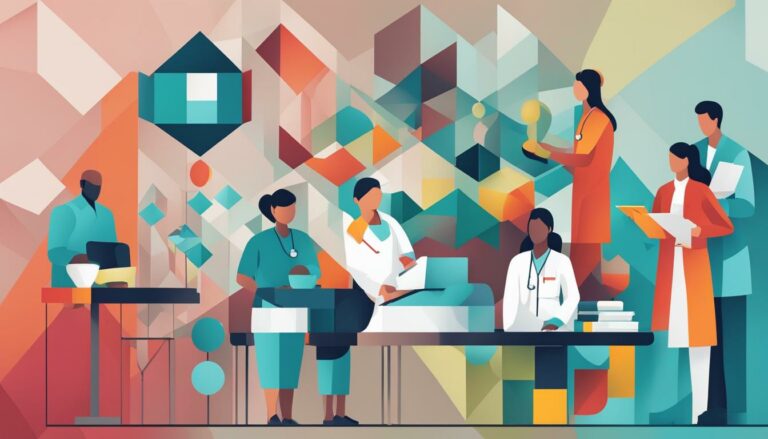Are you an international medical student embarking on clinical rotations in new to adapting to new healthcare settings? It’s natural to feel a little overwhelmed by the prospect of adapting to unfamiliar environments, patient populations, and medical practices. But fear not! With the right approach and mindset, you can navigate these healthcare transitions with confidence.
Locations like New York City, Boston, and California offer diverse clinical rotation opportunities, providing you with a rich learning experience. To ensure a smooth transition, there are several key steps you can take.
Key Takeaways:
- Research the healthcare system of the host country to understand its structure, policies, and procedures.
- Communicate with preceptors, instructors, and peers to gain insights into the expectations and requirements of the clinical rotation.
- Observe and learn from local healthcare providers to understand their practices and adapt more effectively.
- Actively participate in patient care to enhance your skills and gain practical experience.
- Address language barriers by learning the local language or working with translators to ensure effective communication.
By following these tips and insights, you’ll be well-prepared to navigate the changes and challenges of new healthcare settings. Let’s dive deeper into each of these areas to help you make the most of your clinical rotations.
Researching the Healthcare System
As an international medical student, understanding the healthcare system in your host country is crucial to effectively adapt to new healthcare settings. By researching the structure, policies, and procedures of the healthcare system, you can navigate clinical rotations more confidently and efficiently.
Start by familiarizing yourself with the organization of the healthcare system. Learn about the different levels of care, such as primary, secondary, and tertiary care, and how healthcare services are delivered. This knowledge will help you understand the roles and responsibilities of healthcare professionals and how they collaborate.
Additionally, it is essential to familiarize yourself with the policies and procedures that govern patient care. This includes understanding the documentation requirements, guidelines for prescribing medications, and protocols for patient consultations. Being knowledgeable about these aspects will enable you to adhere to local standards and provide care according to the regulations.
Moreover, communicate with your preceptors, instructors, and peers to gain valuable insights into the specific expectations and requirements of the clinical rotation. Seek their guidance on how to best navigate the healthcare system and adapt to the environment. By actively seeking feedback and advice, you can identify areas for improvement and enhance your skills.
“Researching the healthcare system empowers international medical students to confidently navigate clinical rotations and provide quality care.”
Keep in mind that healthcare systems can vary significantly between countries. Therefore, it is essential to adapt and be flexible in your approach. Embrace the opportunity to learn about different healthcare practices and appreciate the unique aspects of the host country’s system.
Benefits of Researching the Healthcare System:
- Enhances your understanding of the healthcare structure
- Helps you navigate policies and procedures
- Enables you to provide care according to local standards
- Guides your interactions with healthcare professionals
- Facilitates effective communication and collaboration
To illustrate the importance of researching the healthcare system, consider the following table that highlights key differences in healthcare policies and procedures:
| Aspect | Host Country A | Host Country B |
|---|---|---|
| Primary Care Structure | General practitioners serve as the primary point of contact for non-emergency healthcare needs. | Primary care is mainly provided through community health centers, where patients can access a range of services. |
| Prescription Medications | Prescriptions are administered electronically and can be easily refilled at any pharmacy. | Prescriptions strictly require handwritten notes from healthcare providers and follow a centralized dispensing system. |
| Ethical Considerations | Patient autonomy is highly valued, and decisions are made collaboratively between patients and healthcare providers. | Family involvement in medical decision-making is prioritized, and consent is sought from multiple family members. |
By understanding and adapting to the healthcare system, you can provide patient-centered care while respecting local practices and regulations. So, invest time in researching the healthcare system before your clinical rotations to ensure a successful and fulfilling experience.
Observing and Learning from Local Healthcare Providers
When adapting to new healthcare settings, one of the most valuable learning experiences for international medical students is observing and learning from local healthcare providers. By closely observing how these providers interact with patients, diagnose and treat conditions, and manage healthcare resources, students can gain a deeper understanding of local medical practices and enhance their knowledge and skills.
Observing local healthcare providers allows students to witness firsthand the practical application of medical knowledge in a specific cultural context. This exposure not only expands their clinical knowledge but also helps them adapt to the new healthcare setting by learning from the practices that are most effective in that particular environment.
By studying the techniques and approaches of local healthcare professionals, students can gather insights into the cultural nuances that influence healthcare decisions and treatment options. This understanding enables them to provide more culturally sensitive and patient-centered care, which is essential when working with diverse patient populations.
Furthermore, observing local healthcare providers offers international medical students the opportunity to see different medical practices and techniques that may be unique to the host country. This exposure broadens their perspective on healthcare and helps them develop a versatile skill set that can be adapted to various medical settings.
“By observing local healthcare providers, international medical students can learn valuable lessons that textbooks alone cannot provide. It allows them to see the practical application of medical knowledge in real-life scenarios and adapt their skills accordingly.”
Through this process of observation and learning, international medical students acquire a holistic understanding of healthcare in the host country and develop the ability to adapt to different medical practices. By incorporating the best practices they observe into their own clinical approach, students can provide optimal care to their patients.
Overall, observing and learning from local healthcare providers is a crucial step for international medical students in their journey to adapt to new healthcare settings. It equips them with the knowledge, skills, and cultural understanding necessary to provide effective and patient-centered care in diverse medical environments.
Key Takeaways:
- Observing local healthcare providers helps international medical students understand the practical application of medical knowledge in specific cultural contexts.
- By learning from local practices, students can adapt their skills and provide culturally sensitive and patient-centered care.
- International medical students can gain insights into unique medical practices and techniques by observing local healthcare providers.
- Through observation and learning, students develop a versatile skill set that can be adapted to various medical settings.
Active Participation in Patient Care
Active participation in patient care is a crucial aspect of clinical rotations for international medical students. By actively engaging with patients, students have the opportunity to learn from their experiences and develop practical skills that will benefit them in their future medical career.
When working with patients, it is important to approach each interaction with respect, empathy, and a willingness to listen. By respecting patient beliefs and values, students can establish trust and build a strong patient-provider relationship. This not only enhances the patient’s experience but also allows students to gain a deeper understanding of diverse cultural perspectives.
Learning from patient experiences is invaluable in healthcare education. Each patient has a unique journey and story to share, providing students with insights into different medical conditions, treatment outcomes, and the overall impact of healthcare on patients’ lives. Actively listening to patients and asking thoughtful questions can help students broaden their knowledge and develop a holistic understanding of patient care.
“Actively engaging with patients during clinical rotations allows students to bridge the gap between theory and practice. It provides a real-world perspective that cannot be gained from textbooks or lectures.”
Benefits of Active Participation in Patient Care:
- Hands-on learning experience
- Enhanced clinical skills
- Improved communication and interpersonal skills
- In-depth understanding of patient perspectives
- Empathy and compassion development
By actively participating in patient care, international medical students not only gain practical experience but also cultivate the qualities of a compassionate and patient-centered healthcare provider. This active engagement fosters growth, both personally and professionally, and prepares students to provide high-quality care in diverse healthcare settings.
| Benefits of Active Participation in Patient Care |
|---|
| Hands-on learning experience |
| Enhanced clinical skills |
| Improved communication and interpersonal skills |
| In-depth understanding of patient perspectives |
| Empathy and compassion development |
Addressing Language Barriers
During clinical rotations, international medical students may encounter language barriers that can hinder effective communication in healthcare settings. However, addressing these barriers proactively is crucial to ensure optimal patient care and successful integration into the local healthcare system.
A key strategy for addressing language barriers is to learn the local language. By investing time and effort into learning the language spoken by patients and healthcare providers in the host country, international medical students can enhance their ability to communicate effectively and build rapport with patients. Learning the local language not only enables clear communication but also shows respect for the local culture and facilitates a deeper understanding of patients’ needs and concerns.
For international medical students who may not have sufficient time to master the local language before clinical rotations, working with professional translators can be an effective solution. Translators can bridge the language gap between patients and healthcare providers, ensuring accurate communication and preventing misunderstandings that could compromise patient care.
“Language barriers can create significant challenges in healthcare settings. It is essential for international medical students to actively address these barriers to provide the best possible care for patients.”
Additionally, utilizing effective communication techniques such as clear and concise speech, active listening, and non-verbal cues can enhance communication despite language barriers. International medical students should focus on using simple language and avoiding medical jargon to ensure comprehension by patients. Encouraging patients to express themselves, asking clarifying questions, and using visual aids when available can also facilitate communication and improve patient understanding.
Effective communication in healthcare is a team effort, and international medical students should collaborate with fellow healthcare providers to overcome language barriers. Seeking assistance from colleagues who are fluent in the local language can help facilitate communication during patient interactions and ensure comprehensive care.
Addressing language barriers is an ongoing process that requires continuous improvement. By actively engaging in language learning, utilizing professional translators when needed, and employing effective communication techniques, international medical students can navigate language barriers and provide quality healthcare services to diverse patient populations.
Benefits of Addressing Language Barriers
Efforts to address language barriers in healthcare settings have numerous benefits for patients, healthcare providers, and healthcare systems:
- Improved patient satisfaction: Clear and effective communication enhances patients’ understanding of their medical conditions, treatment plans, and overall care. This leads to higher patient satisfaction and a better patient experience.
- Enhanced patient safety: Miscommunication due to language barriers can result in medical errors, misdiagnosis, and delayed treatment. By addressing language barriers, international medical students contribute to patient safety and reduce the risk of adverse health outcomes.
- Greater cultural competency: Learning the local language and understanding cultural nuances foster cultural competency among international medical students. This enables them to provide patient-centered care that respects patients’ beliefs, values, and cultural practices.
- Effective collaboration and teamwork: Overcoming language barriers promotes seamless collaboration among healthcare providers from diverse backgrounds, fostering a supportive and inclusive work environment.
| Benefits of Addressing Language Barriers | Description |
|---|---|
| Improved patient satisfaction | Clear and effective communication leads to higher patient satisfaction and a better patient experience. |
| Enhanced patient safety | Addressing language barriers reduces the risk of medical errors, misdiagnosis, and delayed treatment. |
| Greater cultural competency | Learning the local language and understanding cultural nuances fosters cultural competency, allowing for patient-centered care. |
| Effective collaboration and teamwork | Overcoming language barriers promotes seamless collaboration among healthcare providers from diverse backgrounds. |

Mental Preparation
Working in healthcare settings can be emotionally demanding, especially for international medical students during their clinical rotations. The high-stress environments and interactions with critically ill patients can take a toll on their mental well-being. To navigate these challenges, it is crucial for students to engage in effective mental preparation and seek support when needed.
Managing the emotional toll of healthcare requires self-awareness, resilience, and coping strategies. By acknowledging and understanding their emotions, students can better navigate the demands of their clinical rotations. It is important to recognize that it is normal and human to feel a range of emotions, including stress, sadness, frustration, or even burnout.
One effective strategy for mental preparation is to develop self-care routines that prioritize mental and emotional well-being. Engaging in activities such as exercise, mindfulness, hobbies, or spending time with loved ones can help alleviate stress and promote mental resilience.
“Taking care of your mental health is just as important as taking care of your patients. Remember to prioritize self-care to maintain your well-being throughout your clinical rotations.”
Seeking support from peers, mentors, or mental health professionals can also be invaluable during challenging times. Having someone to talk to, share experiences, and seek guidance can provide a sense of relief and validation. Additionally, universities and healthcare institutions often offer counseling services or resources for students struggling with mental health issues.
| Strategies for Mental Preparation | Benefits |
|---|---|
| Develop self-care routines | – Alleviates stress – Promotes mental resilience – Enhances overall well-being |
| Seek support from peers, mentors, or professionals | – Provides validation and empathy – Offers guidance and advice – Assists in managing emotions |
Remember, mental preparation is an ongoing process that should be prioritized throughout your healthcare journey. By taking care of your mental health and seeking support when needed, you can navigate the emotional challenges of healthcare settings more effectively and provide better care to your patients.
Ethical Considerations in Patient Care
When providing patient care in a different country, international medical students must navigate the complex landscape of ethical considerations. Understanding the cultural differences in healthcare and adapting to local practices are vital for delivering ethical care to patients.
Different countries have their own set of laws, regulations, and cultural norms that shape healthcare practices. It is crucial for international medical students to be aware of these differences and ensure they align their care with the ethical standards of the host country.
“Effective healthcare relies not only on medical expertise but also on respecting cultural differences and individual patient values.”
Respecting cultural differences is at the heart of providing ethical care. This means acknowledging and accommodating diverse beliefs, values, and practices that may influence healthcare decisions and treatment preferences.
Adapting to local practices goes beyond clinical skills. It involves understanding the social, economic, and political factors that shape healthcare delivery. By familiarizing themselves with the local context, international medical students can provide care that is culturally sensitive and appropriate.
Case Study: Cultural Considerations in End-of-Life Care
A significant aspect of ethical care is recognizing the cultural differences in end-of-life care. Let’s consider a case study that highlights the importance of cultural sensitivity in this context:
| Cultural Factors | Ideal Approach |
|---|---|
| Country X: Strong emphasis on family involvement in end-of-life decision-making. | Engage and communicate closely with the patient’s family to ensure their values and preferences are respected. |
| Country Y: High importance placed on pain management and comfort during end-of-life care. | Focus on palliative care, providing pain relief and maximizing the patient’s comfort throughout their journey. |
| Country Z: Belief in the continuity of life beyond death. | Respect and support spiritual practices and rituals that are integral to the patient’s beliefs and provide comfort during the end-of-life process. |
By considering cultural differences and adapting their approach accordingly, international medical students can provide patient-centered care that respects individual values and promotes positive health outcomes.
Approaching Ethical Dilemmas
International medical students may encounter ethical dilemmas that stem from the intersection of their own cultural backgrounds and the host country’s healthcare practices. To navigate these situations effectively, it is essential to:
- Seek guidance from local healthcare professionals who have a comprehensive understanding of the cultural nuances and ethical considerations.
- Engage in respectful dialogue with patients and their families to understand their perspectives, concerns, and expectations.
- Consider case studies and ethical frameworks that can provide guidance in challenging situations.
- Collaborate with colleagues and supervisors to discuss ethical dilemmas and seek collective solutions.
By approaching ethical dilemmas with cultural sensitivity, open-mindedness, and a commitment to patient-centered care, international medical students can navigate the complexities of providing ethical care in a different healthcare setting.
Adapting to New Healthcare Settings Wrap Up
Adapting to new healthcare settings during clinical rotations can be a challenging journey for international medical students. However, with proper preparation and an open mindset, you can successfully navigate these experiences and make the most of your time in the host country. By following the tips and insights outlined in this article, you will be better equipped to adapt to the unique healthcare environment and contribute to patient care.
Researching the healthcare system in the host country is a crucial first step. Understanding the structure, policies, and procedures will help you acclimate more quickly and confidently. Take the initiative to communicate with your preceptors, instructors, and peers to glean valuable insights and guidance, ensuring that you meet the expectations and requirements of your clinical rotation.
Observing and learning from local healthcare providers allows you to gain a deeper understanding of their practices. By studying how they interact with patients, diagnose and treat conditions, and manage healthcare resources, you can adapt to the new setting and enhance your own knowledge and skills.
Active participation in patient care is key to making the most of your clinical rotations. By working alongside patients, you can learn from their experiences and develop practical skills. Remember to approach patient care with respect and cultural sensitivity, as understanding and appreciating different beliefs and values is an essential aspect of providing ethical care.
Addressing language barriers is another important consideration. Efforts to learn the local language or working with translators will help ensure effective communication with both patients and healthcare providers. Finally, mental preparation is crucial as clinical rotations can be emotionally challenging. Develop strategies to manage the emotional toll and seek support when needed.
In conclusion, by embracing the opportunity to adapt to new healthcare settings, international medical students can gain valuable experience and contribute to patient care. The journey may be challenging, but with the right mindset and preparation, you can thrive in your clinical rotations and make a positive impact in the host country’s healthcare system.
See the Top 10 Benefits of Travel Nursing
How can I adapt to new healthcare settings during clinical rotations?
To adapt to new healthcare settings, you should research the healthcare system in the host country, communicate with preceptors and peers, observe and learn from local healthcare providers, actively participate in patient care, address language barriers, and be mentally prepared for the emotional toll.
Why is researching the healthcare system important for international medical students?
Researching the healthcare system helps international medical students understand the structure, policies, and procedures of the host country’s healthcare system. This knowledge allows students to adapt more quickly and confidently to new healthcare settings.
How can I learn from local healthcare providers during clinical rotations?
Observing how local healthcare providers interact with patients, diagnose and treat conditions, and manage healthcare resources can help international medical students gain a deeper understanding of local medical practices and adapt to the new setting.
Why is active participation in patient care important during clinical rotations?
Actively participating in patient care allows international medical students to learn from patient experiences and gain practical skills. It is important to be respectful and culturally sensitive to the beliefs, values, and practices of the patients.
How can I address language barriers during clinical rotations?
International medical students can address language barriers by learning the local language or working with translators. Effective communication is crucial in patient care, and efforts should be made to ensure effective communication with patients and healthcare providers.
How can I mentally prepare for the challenges of working in healthcare?
Mental preparation involves recognizing the emotional toll that comes with working in healthcare and developing strategies to manage emotions effectively. Seeking support when needed is also important to maintain mental well-being.
Why are ethical considerations important in patient care during clinical rotations?
Different countries have different laws, regulations, and cultural norms that impact healthcare practices. International medical students must be mindful of these differences and ensure that they provide ethical care to their patients by respecting cultural differences and adapting to local practices.
How can international medical students successfully adapt to new healthcare settings?
By following the tips and insights mentioned above, international medical students can successfully navigate clinical rotations in new healthcare settings. With proper preparation, an open mindset, and a willingness to learn, students can gain valuable experience and contribute to patient care in the host country.




